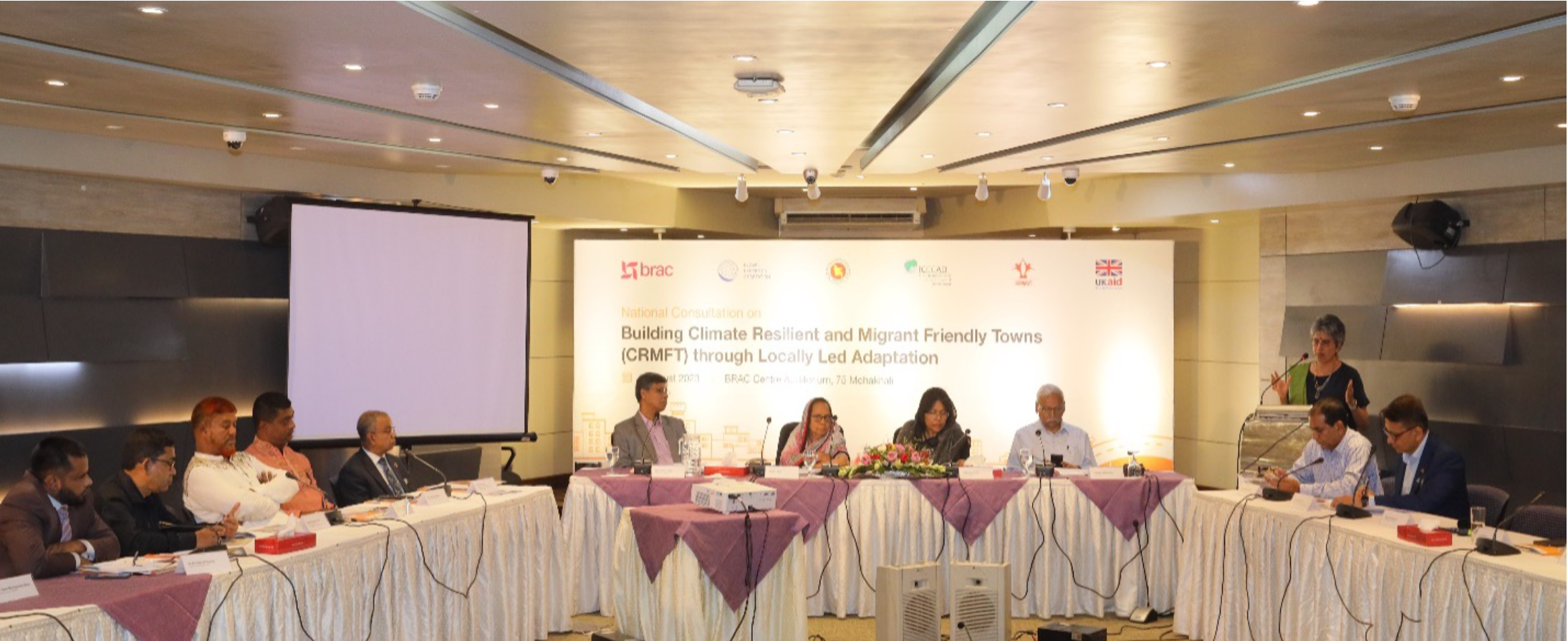
The critical role of communities in deciding priorities for adapting to the impacts of climate change was emphasized during a National Consultation organized by BRAC and the Global Center on Adaptation (GCA) in Dhaka.
Attended by Hon. Habibun Nahar, Deputy Minister, Ministry of Environment Forest and Climate Change (MoEFCC); Dr. Farhina Ahmed, Secretary, MoEFCC; the Mayors of Patuakhali and Kuakata; community representatives from Mongla, and over 60 national stakeholders, the consultation focused on efforts to build climate resilient and migrant-friendly towns in Bangladesh.
With over 50% of urban residents living in informal settlements in Bangladesh, addressing their vulnerability is a key priority. At the same time, supporting secondary cities to plan for climate migration could reduce informality, and support economic growth, turning a potential burden into an opportunity. Goal 3 of Bangladesh’s National Adaptation Plan is focused on Climate-Smart Cities, including building the resilience of the urban poor.
GCA has partnered with BRAC to support the development of Climate Resilient, Migrant Friendly Towns in Bangladesh, with support from the UK Government. Over the last year, work has been ongoing in Mongla, the second-largest seaport in the country, to support communities living in informal settlements to map their settlements, identify key climate vulnerabilities, and develop People’s Climate Resilience Plans.
The process draws on the extensive experience of BRAC, and the Slum Dwellers International affiliate organization SPARC, in mobilizing and supporting communities to plan through a locally-led process. In Mongla, the communities have worked under the leadership of Mayor Sheikh Abdur Rahman to identify and prioritize solutions for the significant climate threats they face, including in particular rising salinity levels and a lack of freshwater.
Despite water stress, the number of migrants flowing into Mongla is on the rise due to ‘push’ and ‘pull’ factors in the southwestern region. Push factors include climate hazards and the lack of economic opportunities in the areas where the migrants originate from (mainly Bagerhat, Pirojpur, Barishal, Khulna, Noakhali, Satkhira). Pull factors include the rise in economic opportunities in Mongla due to its Port, the inauguration of Padma Bridge, and the declaration of Mongla as an Export Processing Zone.
The Locally Led Adaptation (LLA) approach modeled in Mongla is now being extended to three new paurashavas – Patuakhali, Kuakata and Bhola – to inform investments under the Coastal Towns Climate Resilience Project (CTCRP), financed by the Asian Development Bank and Implemented by the Local Government Engineering Department (LGED).
Deputy Minister Habibun Nahar noted her particular interest in seeing progress in the implementation of the Plan developed in Mongla, which is her constituency.
Community representatives from Mongla described how the process helped them understand what climate change means for their locality, and to develop solutions. “We urge the Mayor, the municipality, and MoEFCC to support us in implementing the solutions we have prioritized,” said Chompa Begum from Narikeltola Guccho Gram, Mongla.
Special Guest Dr. Ahmed said existing local government structures should be used to channel funds to implement solutions. She also pointed to the National Strategy on Internal Displacement Management, which guides the planned rehabilitation of internally displaced people in Bangladesh.
Anju Sharma, GCA’s Global Lead on Locally Led Adaptation, reaffirmed GCA’s commitment to working hand-in-hand with the government and development partners to implement the priority solutions identified through the People’s Plans in Mongla.
A panel discussion was moderated by Professor Saleemul Huq, Director of the International Center for Climate Change and Development. During the discussion, Sanjay Kumar Bhowmik, Additional Secretary, MOEFCC, emphasized the importance of traditional knowledge in developing adaptation solutions. The Mayors supported the active engagement of community members in designing and implementing sustainable adaptation solutions.
Dr. Md. Sarwar Bari, Director General, Monitoring, Inspection and Evaluation Wing, Local Government Division, highlighted the importance of building the capacity of local government representatives to implement LLA solutions; and take into account lessons from other LLA projects in Bangladesh.
Anna Ballance, Senior Climate Change and Environment Advisor, British High Commission, Dhaka, appreciated the role of the GCA in supporting the scaling up of LLA solutions.
SA Abdullah Al Mamun, Urban Specialist, ADB appreciated GCA’s contribution to the slum improvement component of CTCRP. Mokhlesur Rahman, CTCRP Project Director, LGED reiterated the value addition of the People’s Climate Resilience Plans in designing the Project’s slum improvement component.
In conclusion, Dr. Liakath Ali, Director, BRAC, appreciated MOEFCC’s strong commitment and support towards scaling up the LLA approach and thanked the participants for their valuable contributions.